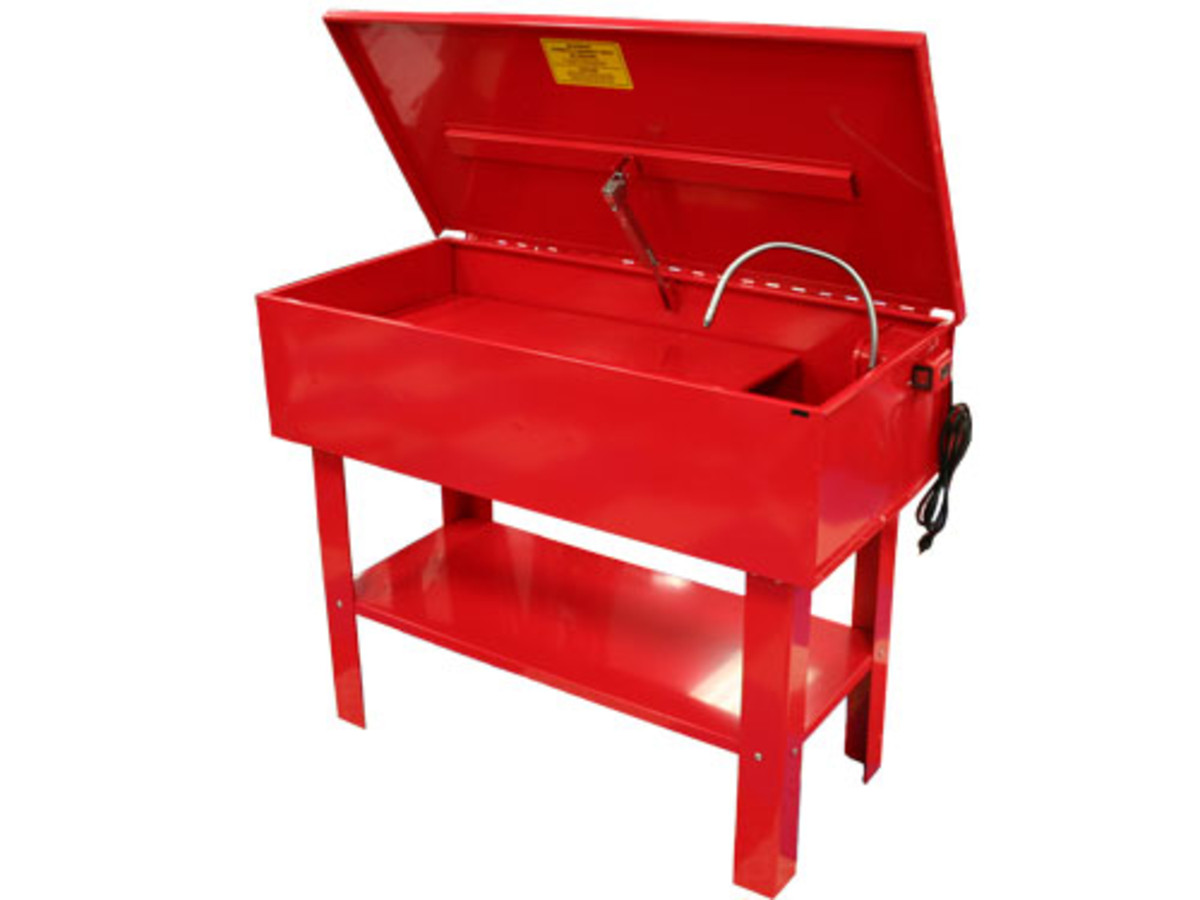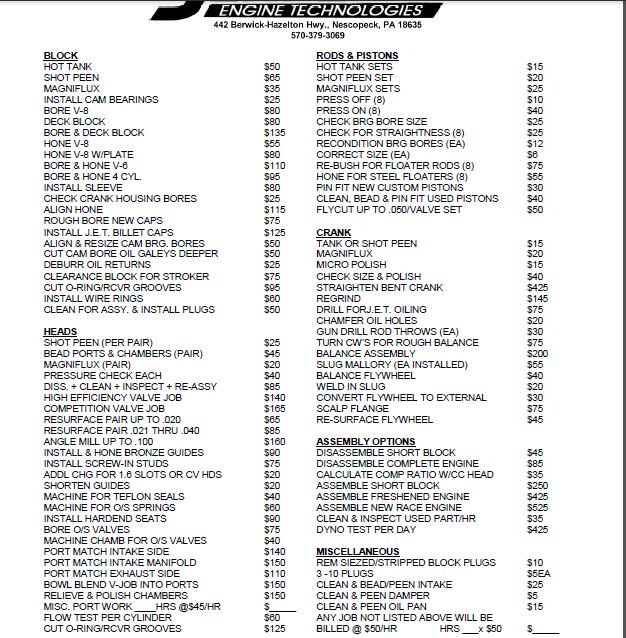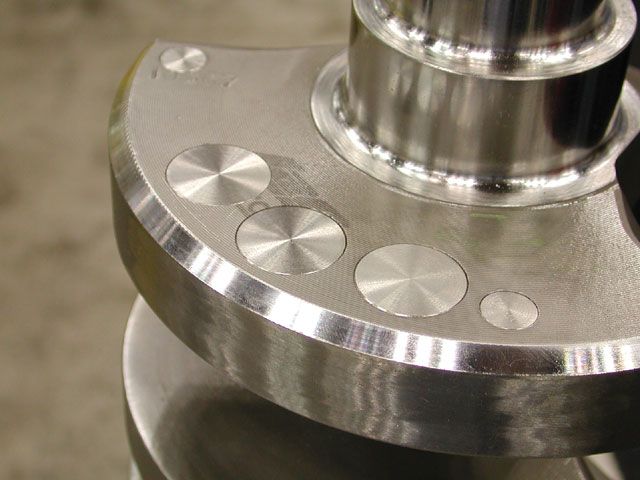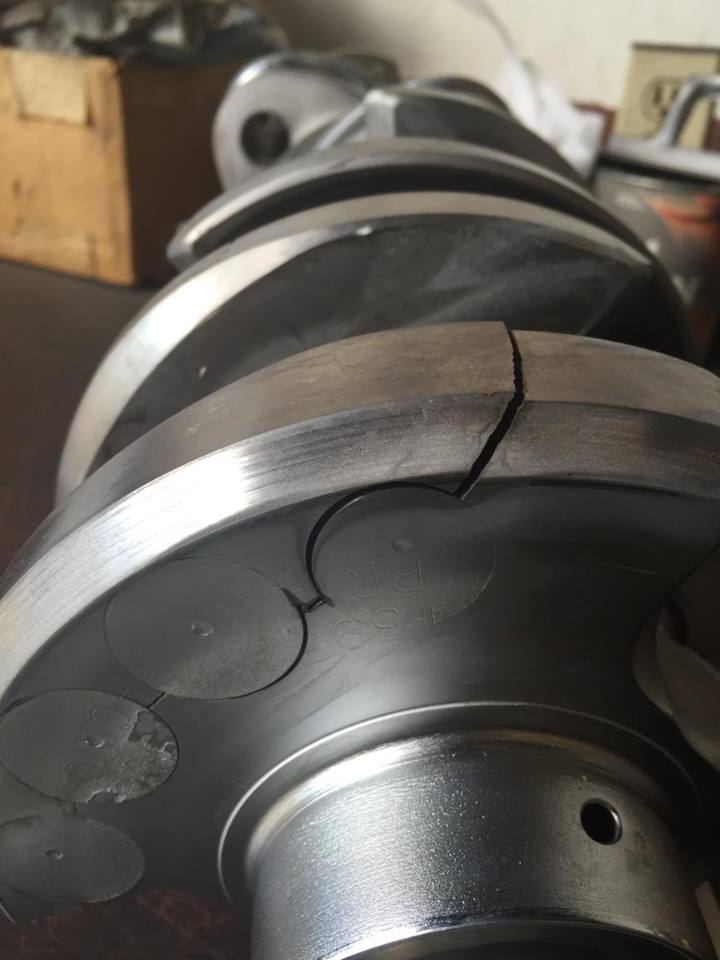READ THIS THREAD AND LINKS FIRST
viewtopic.php?f=87&t=4786&p=12990&hilit=machine+shop+written#p12990
MAKE SURE YOU CLEAN RECENTLY MACHINED PARTS THE MACHINE SHOPS VERY UNLIKELY TO DO A GOOD JOB
http://www.gregsmithequipment.com/40-Gallon-Parts-Washer

ALWAYS GET A WRITTEN DETAILED LIST OF WHATS TO BE DONE AND THE COST AND EXPECTED COMPLETION DATES, BEFORE YOU START, and TAKE PICTURES OF THE CAR AND OR PARTS
KEEP in mind if you don,t have a firm dated contract listing everything to be done and a FIRM due date when the parts are to be delivered, IF You paid in advance, the machine shop most likely spent the money, and now has no incentive to work on your stuff.
THIS IS ONE AREA WHERE JOINING A LOCAL HOT ROD OR CORVETTE CLUB CAN REALLY PAY OFF! MEMBERS USUALLY CAN TELL YOU WHAT SHOPS ARE RIP-OFFS AND WHICH DO QUALITY WORK AT A FAIR PRICE AND TELL YOU WHICH TECH DO THE BEST WORK
Choosing an Automotive Repair Facility
Gathered this from ASE.com
Choosing the Right Repair Shop
No matter what you drive - sports car, family sedan, pick-up, or mini-van - when you go in for repairs or service, you want the job done right. The following advice should take much of the guesswork out of finding a good repair establishment.
Don't just drop your vehicle off at the nearest establishment and hope for the best. That's not choosing a shop, that's merely gambling.
I. Preliminaries
• Read your owner's manual to become familiar with your vehicle and follow the manufacturer's suggested service schedule.
• Start shopping for a repair facility before you need one; you can make better decisions when you are not rushed or in a panic.
• Ask friends and associates for recommendations; even in this high-tech era, old-fashioned word of mouth reputation is valuable.
• Check with your local consumer organization(s) regarding the reputation of the business. Inquire about complaints and the rate of resolution of complaints.
• If possible, arrange for alternate transportation in advance so you will not feel forced to choose a shop solely on location.
Once you choose a repair shop, start off with a minor job; if you are pleased; trust them with more complicated repairs later.
II. At the Shop
• Look for a neat, well organized facility, with vehicles in the parking lot equal in value to your own and modern equipment in the service bays.
• Professionally run establishments will have a courteous, helpful staff. The service writer should be willing to answer all of your questions.
• Feel free to ask for the names of a few customers. Call them.
• All policies (labor rates, guarantees, methods of payment, etc.) should be posted and/or explained to your satisfaction.
• Ask if the shop customarily handles your vehicle make and model. Some facilities specialize.
• Ask if the shop usually does your type of repair, especially if you need major work.
• Look for signs of professionalism in the customer service area: civic and community service awards, membership in the Better Business Bureau, AAA-Approved Auto Repair status, customer service awards.
• Look for evidence of qualified technicians, such as trade school diplomas, certificates of advanced course work, and ASE certifications - a national standard of technician competence.
The backbone of any shop is the competence of its technicians.
III. Follow-Up
• Keep good records; keep all paperwork.
• Reward good service with repeat business. It is mutually beneficial to you and the shop owner to establish a relationship.
• If the service was not all you expected, don't rush to another shop. Discuss the problem with the service manager or owner. Give the business a chance to resolve the problem. Reputable shops value customer feedback and will make a sincere effort to keep your business
A few other things that will serve you well (not from ASE.com, but from my experience as an Automotive Repair Technician over the last decade or so)
• Ask to talk to the technician that will be working on your vehicle, he may be busy but will usually be glad to talk to you.
• Look for the ASE Blue Seal of Excellence- at least 75% of technicians performing diagnosis and repairs must be ASE certified, and each area of service offered in the shop must be covered by at least one ASE-Certified Technician
• Be nice to your technician, remember he is the one who will be working on your vehicle
• Do not insist to the technician that you know what is wrong with your vehicle- this is what he gets paid to diagnose and odds are he knows far more than you do.
• Once you find a technician you are comfortable with, keep going back to the same shop and insist on that technician- this not only builds a relationship between you and the technician, but between the technician and the vehicle as well- this will allow the technician to notice when something “isn’t right†with your vehicle.
• If you feel the technician is doing a good job, it never hurts to let him know.
IT USUALLY HELPS IF YOU TAKE THE TIME TO EXPLAIN IN DETAIL WHAT YOU EXPECT TO BE DONE!
IF YOU ASK BOTH THE MECHANIC AND SERVICE TECHS NAMES AND WRITE THEM DOWN!
AND IF YOU TIP BOTH THE SERVICE ORDER WRITER AND THE SERVICE TECHNICIAN, DOING THE WORK IF YOU WANT THINGS DONE CORRECTLY, IT MIGHT COST YOU AN EXTRA $20-$40, but IN MOST CASES IT CAN SAVE YOU HUNDREDS OF DOLLARS IN NON-NEEDED WORK CHARGES, AND YOUR MORE LIKELY TO GET THE JOB DONE CORRECTLY, BOTH THE SERVICE ORDER WRITER AND THE SERVICE TECHNICIAN, DOING THE WORK HAVE SOME DISCRETION ON WHAT GETS REPLACED & REPAIRED AND WHAT GETS CHARGED, OR WARRANTED....TIP THE ODDS IN YOUR FAVOR!!
RELATED INFO
http://www.hotrod.com/how-to/engine...gine-building-mistakes-and-how-to-avoid-them/
http://garage.grumpysperformance.com/index.php?threads/496ci-revamped.14642/
http://www.aa1car.com/library/engine2t.htm
viewtopic.php?f=87&t=4786&p=12990&hilit=machine+shop+written#p12990
MAKE SURE YOU CLEAN RECENTLY MACHINED PARTS THE MACHINE SHOPS VERY UNLIKELY TO DO A GOOD JOB
http://www.gregsmithequipment.com/40-Gallon-Parts-Washer

ALWAYS GET A WRITTEN DETAILED LIST OF WHATS TO BE DONE AND THE COST AND EXPECTED COMPLETION DATES, BEFORE YOU START, and TAKE PICTURES OF THE CAR AND OR PARTS
KEEP in mind if you don,t have a firm dated contract listing everything to be done and a FIRM due date when the parts are to be delivered, IF You paid in advance, the machine shop most likely spent the money, and now has no incentive to work on your stuff.
THIS IS ONE AREA WHERE JOINING A LOCAL HOT ROD OR CORVETTE CLUB CAN REALLY PAY OFF! MEMBERS USUALLY CAN TELL YOU WHAT SHOPS ARE RIP-OFFS AND WHICH DO QUALITY WORK AT A FAIR PRICE AND TELL YOU WHICH TECH DO THE BEST WORK
Choosing an Automotive Repair Facility
Gathered this from ASE.com
Choosing the Right Repair Shop
No matter what you drive - sports car, family sedan, pick-up, or mini-van - when you go in for repairs or service, you want the job done right. The following advice should take much of the guesswork out of finding a good repair establishment.
Don't just drop your vehicle off at the nearest establishment and hope for the best. That's not choosing a shop, that's merely gambling.
I. Preliminaries
• Read your owner's manual to become familiar with your vehicle and follow the manufacturer's suggested service schedule.
• Start shopping for a repair facility before you need one; you can make better decisions when you are not rushed or in a panic.
• Ask friends and associates for recommendations; even in this high-tech era, old-fashioned word of mouth reputation is valuable.
• Check with your local consumer organization(s) regarding the reputation of the business. Inquire about complaints and the rate of resolution of complaints.
• If possible, arrange for alternate transportation in advance so you will not feel forced to choose a shop solely on location.
Once you choose a repair shop, start off with a minor job; if you are pleased; trust them with more complicated repairs later.
II. At the Shop
• Look for a neat, well organized facility, with vehicles in the parking lot equal in value to your own and modern equipment in the service bays.
• Professionally run establishments will have a courteous, helpful staff. The service writer should be willing to answer all of your questions.
• Feel free to ask for the names of a few customers. Call them.
• All policies (labor rates, guarantees, methods of payment, etc.) should be posted and/or explained to your satisfaction.
• Ask if the shop customarily handles your vehicle make and model. Some facilities specialize.
• Ask if the shop usually does your type of repair, especially if you need major work.
• Look for signs of professionalism in the customer service area: civic and community service awards, membership in the Better Business Bureau, AAA-Approved Auto Repair status, customer service awards.
• Look for evidence of qualified technicians, such as trade school diplomas, certificates of advanced course work, and ASE certifications - a national standard of technician competence.
The backbone of any shop is the competence of its technicians.
III. Follow-Up
• Keep good records; keep all paperwork.
• Reward good service with repeat business. It is mutually beneficial to you and the shop owner to establish a relationship.
• If the service was not all you expected, don't rush to another shop. Discuss the problem with the service manager or owner. Give the business a chance to resolve the problem. Reputable shops value customer feedback and will make a sincere effort to keep your business
A few other things that will serve you well (not from ASE.com, but from my experience as an Automotive Repair Technician over the last decade or so)
• Ask to talk to the technician that will be working on your vehicle, he may be busy but will usually be glad to talk to you.
• Look for the ASE Blue Seal of Excellence- at least 75% of technicians performing diagnosis and repairs must be ASE certified, and each area of service offered in the shop must be covered by at least one ASE-Certified Technician
• Be nice to your technician, remember he is the one who will be working on your vehicle
• Do not insist to the technician that you know what is wrong with your vehicle- this is what he gets paid to diagnose and odds are he knows far more than you do.
• Once you find a technician you are comfortable with, keep going back to the same shop and insist on that technician- this not only builds a relationship between you and the technician, but between the technician and the vehicle as well- this will allow the technician to notice when something “isn’t right†with your vehicle.
• If you feel the technician is doing a good job, it never hurts to let him know.
IT USUALLY HELPS IF YOU TAKE THE TIME TO EXPLAIN IN DETAIL WHAT YOU EXPECT TO BE DONE!
IF YOU ASK BOTH THE MECHANIC AND SERVICE TECHS NAMES AND WRITE THEM DOWN!
AND IF YOU TIP BOTH THE SERVICE ORDER WRITER AND THE SERVICE TECHNICIAN, DOING THE WORK IF YOU WANT THINGS DONE CORRECTLY, IT MIGHT COST YOU AN EXTRA $20-$40, but IN MOST CASES IT CAN SAVE YOU HUNDREDS OF DOLLARS IN NON-NEEDED WORK CHARGES, AND YOUR MORE LIKELY TO GET THE JOB DONE CORRECTLY, BOTH THE SERVICE ORDER WRITER AND THE SERVICE TECHNICIAN, DOING THE WORK HAVE SOME DISCRETION ON WHAT GETS REPLACED & REPAIRED AND WHAT GETS CHARGED, OR WARRANTED....TIP THE ODDS IN YOUR FAVOR!!
RELATED INFO
http://www.hotrod.com/how-to/engine...gine-building-mistakes-and-how-to-avoid-them/
http://garage.grumpysperformance.com/index.php?threads/496ci-revamped.14642/
http://www.aa1car.com/library/engine2t.htm
Last edited by a moderator:



